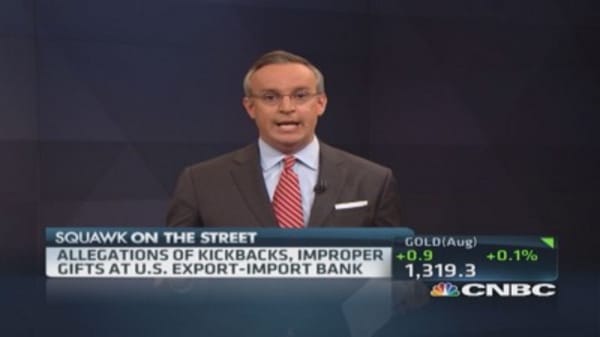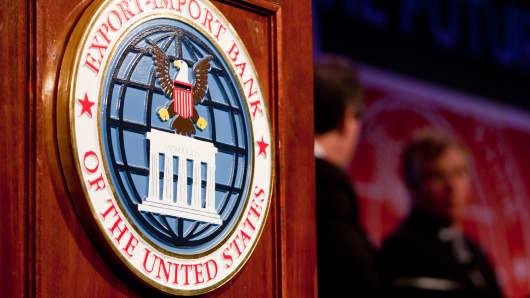Here's what's up with the Ex-Im Bank.
For starters, just what is it?
The Ex-Im Bank is a federal agency created by President Franklin Roosevelt in the depths of the Great Depression to help revive U.S. exports after global trade had all but shut down. The agency draws on an account with the Treasury (aka your tax dollars) to lend money and provide insurance and loan guarantees on U.S. goods shipped overseas. Like a bank, it charges interest and fees for these services, which it then turns over to the Treasury.
According to the agency's latest annual report, the default rate on all this financing was less than a quarter of 1 percent in the latest quarter. That's about half the rate of charge-offs for loans and leases by U.S. commercial banks, according to Federal Reserve data.
That sounds pretty good. Why the big kerfuffle?
The agency's charter expires at the end of September, and that has started the clock again on a long-running debate about the government's role in financing private sector businesses. Unless the charter is renewed, the agency will no longer be able to make new loans. It will basically be reduced to monitoring the loans it's already made and—after those loans are paid off—it would disappear.
What's wrong with the government helping American companies export their Made in the USA products? Doesn't that help keep jobs from being sent to cheap labor markets?
Export growth has been a critical factor in the revival of U.S manufacturing and the creation of new high-tech, high-wage factory jobs. But it's far from clear how much of the revival is due to Ex-Im bank financing. Much of the resurgence has come from forces that have nothing to do with the Ex-Im Bank, include a steep slide in natural gas prices and rising labor costs in developing economies like China.
Read MoreCongressional Republicans weigh Ex-Im Bank renewal: Boehner
Don't small businesses need a leg up to compete in the global market—especially when they're up against foreign companies whose governments provide subsidies and cheap financing?
Some of those companies do need help. But Ex-Im Bank critics argue that the government is not the greatest judge of which companies are going to succeed.
That camp is quick to point to the government's ill-fated support for a solar power maker, Solyndra. The California company burned through more than half a billion dollars in Energy Department loan guarantees before going bankrupt in 2011. In the end, taxpayers were left on the hook for those failed loans.
Wait: What's this about an Ex-Im Bank investigation?
According The Wall Street Journal, the agency has suspended or removed four officials while investigators check into allegations of kickbacks and efforts to steer contracts to favored businesses.
Johnny Gutierrez, an official in the Ex-Im Bank's short-term trade finance division, allegedly took cash payments to help a Florida company get federal financing to export construction equipment to Latin America, according to the Journal, which cited unidentified sources.
Read MoreNeed for the Ex-Im Bank: Bossidy
The newspaper also quoted Gutierrez's lawyer, Douglas McNabb, confirming that Gutierrez was placed on leave after an investigation by the agency's inspector general. But McNabb declined to comment on details.
Two other officials were being investigated over allegations of improperly awarding contracts while the third was being investigated over accusations of "accepting gifts on behalf of a company seeking financing," the newspaper reported.
"The Export-Import Bank has zero tolerance for waste, fraud and abuse. Due to provisions of the Privacy Act, we are prohibited from commenting on any specific personnel matters," Ex-Im Bank spokesman Matt Bevens said in a statement, according to Reuters.
Why are taxpayer dollars going to private companies—just because they export goods and services? Shouldn't they have to go to find a bank or investor like everyone else?
That's the argument some senior Republicans are making, and their cause got a major boost with the recent upheaval in the House leadership, following this month's surprise primary defeat of Majority Leader Eric Cantor. His replacement, Rep. Kevin McCarthy, R-Calif., fired the latest salvo last weekend when he said the Ex-Im bank should be shuttered for good. There are already bills in both the House and Senate that, if enacted, would to shut the agency.
Like many federal agencies, the Ex-Im Bank has spread its financial backing widely, with some $115 billion in direct financing handed out to more than 7,300 companies in virtually every congressional district from Maine to California. That's a lot of bankable talking points for the incumbents in those districts
Who else has a dog in this fight?
The agency is getting strong lobbying support from business groups like the U.S. Chamber of Commerce and the National Association of Manufacturers. But the politics of the Ex-Im Bank makes for strange bedfellows. The agency's critics have included Delta Air Lines, for example, because company executives have argued that cheap Ex-Im Bank financing for Boeingjets sold to overseas airlines give those companies an edge over Delta. (Now that push has come to shove, Delta's CEO is expected to come out and support the agency, according to The Journal.)
Boeing, needless to say, is another major Ex-Im Bank supporter.
—By CNBC's John Schoen





